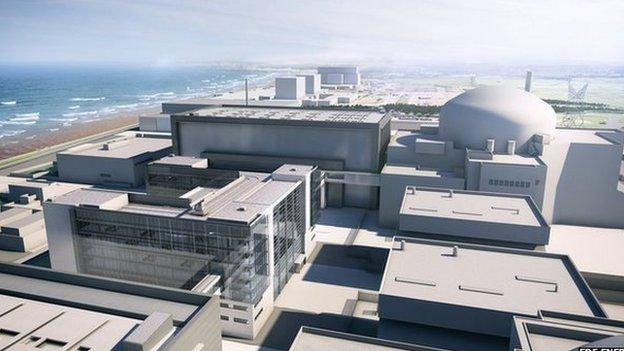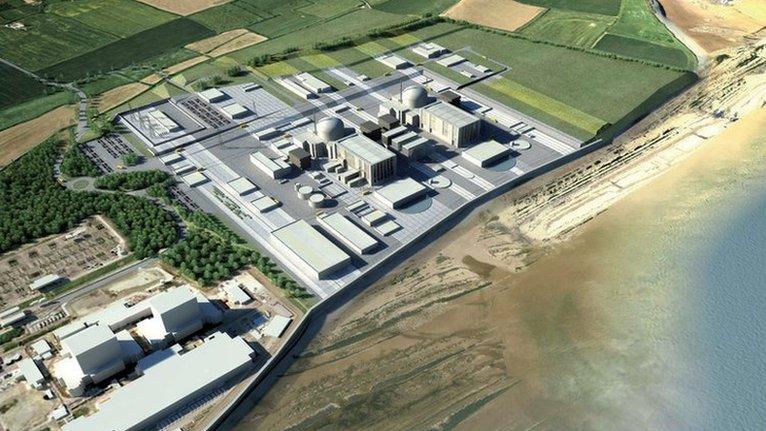Hinkley firm denies fuel claim
- Published

Hinkley currently produces about 1% of the UK's total energy, but this is expected to rise to 7% once the expansion is complete in 2023
The company building Britain's first nuclear power station in a generation has denied a suggestion that the new plant would use controversial MOX fuel.
French state-owned utility EDF said the use of plutonium-based Mixed Oxide fuel was not under consideration for use at the Hinkley Point C plant in Somerset.
Under questioning by the Public Accounts Committee, Mark Higson from the Office for Nuclear Development, said MOX could be used.
Mr Higson was speaking on 4 November.
The OND chief executive told the committee that MOX fuel could be used "in power stations yet to be built. The EPR reactor at Hinkley, for example".
MOX is nuclear fuel that contains more than one oxide of fissile material. It often consists of plutonium along with uranium, from either natural, reprocessed or depleted sources.
EDF, which wants to use French reactor technology backed by Chinese money at Hinkley, responded quickly to the statement, saying it was not correct and that using MOX was not even a consideration.
In a statement, an EDF spokesman said: "We have not used MOX in any of our stations and have no plans to do so in the future in our existing stations or new nuclear stations."
Mixed oxide fuel was contrived as a method of getting rid of Britain's stockpile of civil plutonium - the largest in the world - accumulated from years of reprocessing foreign and UK nuclear waste.
But there is no active plan to dispose of the material, which is now seen as a terrorism target and a proliferation risk because it can be used to make nuclear bombs.
No certain market
Turning plutonium into MOX fuel was thought to be the answer. But the Sellafied MOX plant built to make it failed dramatically at a cost of £1.4bn and was closed in 2011. A planned new MOX facility has a price tag of between £5bn and £6bn to the taxpayer.
But the business case is controversial. To the astonishment of MPs on the committee, Mr Higson explained: "The value of the fuel, we would expect to be less than the cost of operating and building the MOX plant."
In other words, it would be done purely to dispose of the plutonium, with no certain market for the fuel.
EDF says it won't use MOX and Horizon, the other major nuclear company hoping to build reactors in the UK, which is backed by the Japanese firm Hitachi, said it has no plans to use MOX either.
Steve Thomas, professor of energy policy at Greenwich University, commented: "MOX is a nuclear fuel invented by governments to address the embarrassing problem of what to do with separated plutonium. It is expensive, difficult to handle and increases maintenance and storage costs, so utilities will always be very reluctant to use MOX unless forced to do so."
A spokesman for Decc said the government's preferred option for dealing with plutonium remained MOX, but it appeared to row back on the statement made to MPs.
"Mr Higson's reference to Hinkley was merely by way of example. The EPR is capable of burning MOX fuel. Actual use of MOX in Hinkley or any other new build reactors would need to be subject to commercial negotiations with operators concerned. Such commercial negotiations are naturally some way off as the reactors have yet to be built."
The spokesman added that the Nuclear Decommissioning Authority was also looking at alternative options.
Hinkley is already controversial. Peter Atherton of the city firm Liberum Capital called it "the most expensive power station in the world (excluding hydro schemes)".
Criticism has focused on the government decision to allow EDF to charge £92.50 per Megawatt-hour (MWh), twice the current market rate for the electricity which, because it is index linked, would be nearer £121 per MWh by the time the plant opens.
That could earn the French and Chinese state-owned firms up to £80bn over the life of the plant. A controversy over MOX fuel could be the last thing they need.
- Published21 October 2013

- Published21 October 2013

- Published21 September 2015
